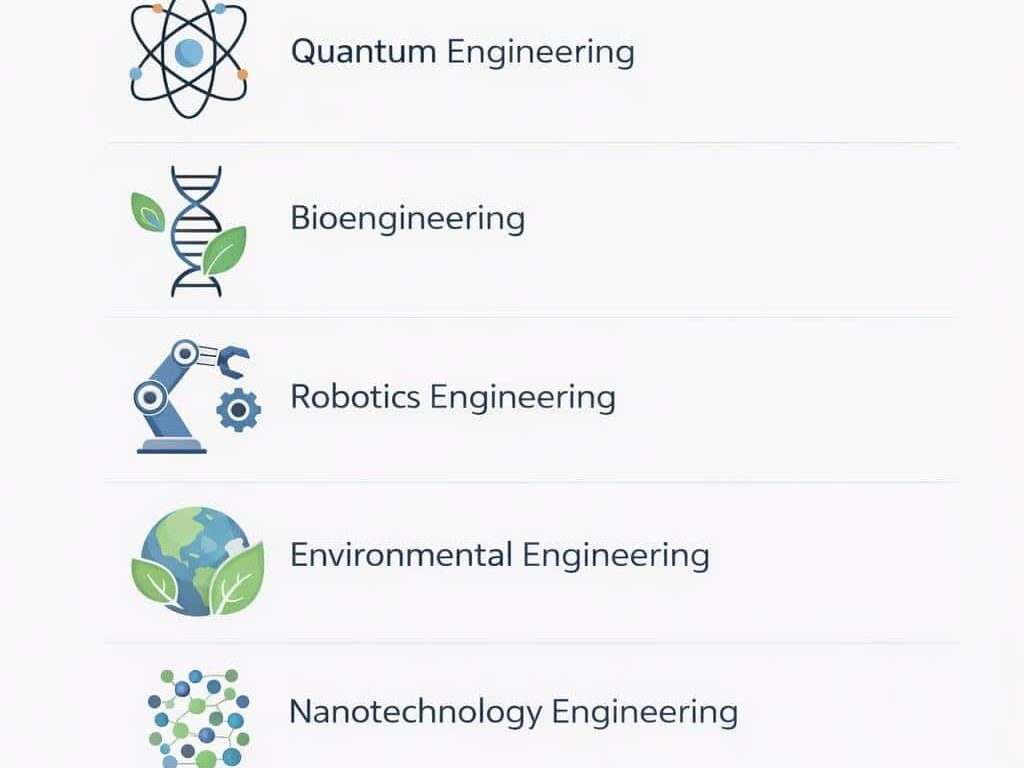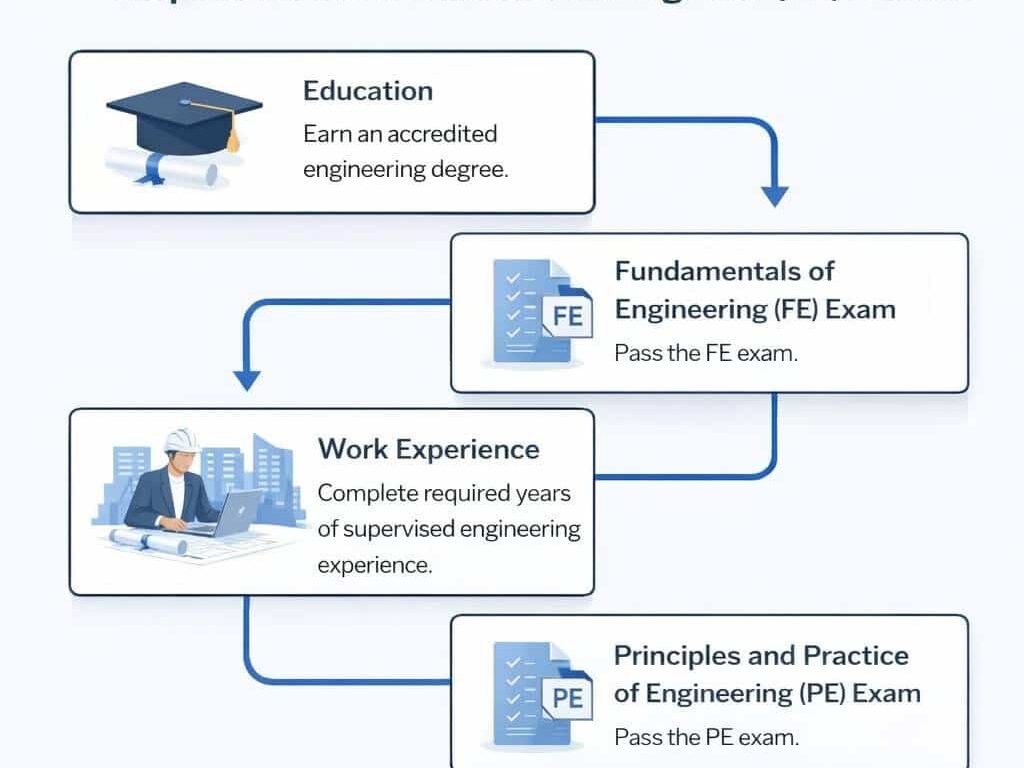Your Path to the Engineering Major: Branches, Education, and Careers

Looking for a path into engineering that actually fits your strengths and goals? This guide walks you through the major branches, what you’ll study, and where each degree can take you.
You’ll see which engineering major lines up with your interests, the education and skills you’ll need, and what doors each path might open.
There are practical tips on choosing courses and building the skills employers actually want.
Key Takeaways
- Pick a major that matches your skills and career dreams.
- Prioritize hands-on projects, not just coursework, to grow professionally.
- Keep an eye on industry shifts and credentials to stay competitive as an engineering major.
Understanding Engineering Majors and Branches
Here’s a look at the core areas and how to match a branch to what you’re good at, or what you actually want to do.
Overview of Major Engineering Disciplines
Civil, mechanical, electrical, chemical, and industrial engineering make up the backbone of most programs. Civil is all about roads, bridges, water systems, and keeping structures safe. Mechanical dives into machines, engines, HVAC, and aerospace parts.
Electrical focuses on power, electronics, and control systems, often overlapping with electronics and computer engineering for things like embedded systems. Chemical engineering covers process design for chemicals, fuels, and pharmaceuticals.
Industrial engineering optimizes factories, logistics, and even healthcare workflows. Environmental engineering tackles water treatment, pollution control, and renewable energy siting.
| Discipline | Main Focus |
|---|---|
| Civil | Infrastructure, safety, public works |
| Mechanical | Machines, engines, aerospace |
| Electrical | Power, electronics, controls |
| Chemical | Processes, chemicals, pharma |
| Industrial | Optimization, logistics, systems |
- Core engineering majors shape most university programs.
- Each branch has its own real-world focus and career path.
- Labs, capstone projects, and design work are standard.
Emerging and Interdisciplinary Engineering Fields

Some of the coolest fields blend the old with the new. Biomedical and bioengineering mix biology with mechanical, electrical, and materials know-how to build medical devices and tissue models.
Robotics and mechatronics fuse mechanical, electrical, and control engineering for automated systems. AI and cybersecurity engineering live inside computer and electrical programs, focusing on algorithms and network defense.
Energy and environmental trends push renewable and nuclear specialties. Petroleum engineering still pops up where oil and gas matter. Marine engineering handles ships and offshore systems, and many schools let you tack on AI, robotics, or renewable minors to a core engineering major.
- Hybrid fields let engineering majors tackle modern challenges.
- Dual majors/minors are common for interdisciplinary work.
- Industry partnerships shape new specializations.
| Emerging Field | Blend of Disciplines |
|---|---|
| Biomedical | Biology, mechanical, electrical |
| Robotics | Mechanical, electrical, controls |
| AI/Cybersecurity | Computer, electrical |
Choosing the Right Branch for You
Try matching tasks to what you enjoy. Like buildings? Civil’s your branch. Prefer machines or engines? Mechanical or aerospace might fit. Love circuits or power grids? Electrical or electronics could be your thing.
Maybe you’re drawn to software or cybersecurity—then computer engineering or IT tracks make sense. Think about where you want to work: hospitals for biomedical, oil fields for petroleum, or factories for industrial engineers.
- Match your interests to real-world tasks, not just course names.
- Check out each program’s co-ops, labs, and industry ties.
- Some fields lead to licensure, others value coding or research skills.
| Interest | Suggested Branch |
|---|---|
| Public works | Civil |
| Machines | Mechanical |
| Circuits | Electrical/Electronics |
| Software | Computer Engineering |
Navigating Engineering Education
Engineering education isn’t just about lectures. The structure, degree levels, labs, and program quality.
Academic Pathways: Undergraduate to Graduate Degrees
Most folks start with a bachelor’s in something specific—mechanical, civil, electrical, or computer engineering. A typical Bachelor of Science takes four years and blends math, physics, and core engineering classes.
You’ll run into calculus, differential equations, and maybe some programming. If you want to lead or design, a master’s (MS or MEng) adds one or two years of deeper training—think advanced thermodynamics, control systems, or environmental process design.
A PhD is for research or teaching at the university level. Dual degrees or combined BS/MS programs can save time, and online or part-time options help if you need flexibility. Internships and co-ops during undergrad often land you that first job.
- Bachelor’s is the entry ticket for most engineering majors.
- Master’s and PhD focus on leadership or research.
- Consider dual degrees or co-ops for broader experience.
| Degree | Typical Duration |
|---|---|
| Bachelor’s | 4 years |
| Master’s | 1–2 years |
| PhD | 4–6 years |
Key Coursework and Hands-On Learning Opportunities

Your classes build both theory and practical skills. Expect core subjects like statics, dynamics, circuits, and materials science, plus the fundamentals of engineering review content.
Major-specific classes dig into thermodynamics (mechanical), operating systems (computer), or water resources (civil/environmental). Labs, capstone projects, and maker spaces let you get your hands dirty—using CAD, FEA, MATLAB, or embedded systems tools.
Look for courses with real-world constraints, budgets, and safety standards. Internships, research gigs, or industry projects teach teamwork and communication. Keep a portfolio or technical report to show off your work—employers and grad schools want proof.
- Hands-on projects matter as much as lectures for engineering majors.
- Major-specific classes build technical depth.
- Document your work for future job or grad school applications.
Accreditation and Engineering Programs
Always check if your program is ABET or regionally accredited. Accredited programs meet standards for curriculum, faculty, and facilities—plus, it’s key for licensure and job prospects.
Look into lab access, faculty research, and industry partnerships. Make sure the program offers courses that fit your interests—pollution control, thermodynamics, or operating systems, for example.
If you’re aiming for a Professional Engineer license, you’ll need an accredited degree, the FE exam, and work experience. Some programs even offer FE prep courses, which can be a real lifesaver.
- Accreditation matters for engineering majors aiming for licensure.
- Labs, faculty, and industry ties shape your education.
- Check for FE exam prep or licensure pathways.
| What to Check | Why It Matters |
|---|---|
| ABET Accreditation | Needed for licensure, jobs |
| Lab Facilities | Hands-on experience |
| Faculty Research | Mentorship, opportunities |
Professional Licensing and Certifications
Licenses and certifications aren’t just paperwork; they show you meet the standards for education, experience, and exams. They shape what jobs you can get.
The Fundamentals of Engineering (FE) Exam
The FE exam kicks off the path to becoming a licensed Professional Engineer (PE). Most people take it right after finishing an accredited bachelor’s or during their last year.
Passing the FE proves you’ve got the basics in math, science, and your chosen field. You’ll register in your state, schedule the computer-based test, and study with practice problems and the FE handbook. Passing earns you the “Engineer-in-Training” (EIT) or “Engineering Intern” (EI) title—something employers expect on entry-level resumes.
- FE exam is step one for licensure.
- Take it after your degree or senior year.
- “EIT” or “EI” titles help on job applications.
Professional Engineer (PE) Licensing

To get a PE license, you need to pass the FE, rack up work experience (usually four years) under a licensed PE, and then pass the PE exam in your discipline. The PE lets you sign and seal plans and take legal responsibility for safety.
Requirements differ by state, so check with your board early. Most boards use the National Council of Examiners for Engineering and Surveying’s three-step process. Keep records and references from supervising PEs—these matter during your application. Once you’re licensed, keep it current with continuing education or renewal rules.
- PE license means legal authority and higher responsibility.
- State rules vary, so start early.
- Work experience and references are key.
| Step | What’s Involved |
|---|---|
| FE Exam | Test after bachelor’s |
| Work Experience | 4 years under PE |
| PE Exam | Final licensure test |
Specialized Certifications and Continuing Education
Certifications target specific skills but don’t replace a PE license. Think safety credentials like the Certified Safety Professional (CSP) or OSHA courses—these show you know workplace safety or regulatory rules.
Choose certifications that fit your role—project managers might go for PMP, while industrial engineers might want quality or control-system certificates. Keep them current with continuing education, refresher courses, or periodic exams. Always list them with renewal dates on your CV and LinkedIn.
- Certifications boost your resume for specialized roles.
- Continuing education keeps credentials valid.
- Choose ones that fit your career direction as an engineering major.
Building Essential Engineering Skills
You’ll want to blend hard skills, clear communication, and hands-on experience, plus you’ll need to practice them in real projects, not just the classroom.
Technical Skills and Core Competencies
Get comfortable with math and physics—they’re the foundation for every engineering major. Master calculus, linear algebra, statics, and dynamics. Learn to read engineering drawings and use tools like CAD (SolidWorks, AutoCAD) and simulation software (ANSYS, MATLAB).
Pick up at least one programming language used in your field—Python for data, C/C++ for embedded, or MATLAB for numerical stuff. Know version control (Git), and if your branch needs it, get hands-on with electronics or materials testing.
Practice systematic problem-solving: define the problem, list constraints, model, and validate with experiments. Keep track of your work with clear notes and calculations—being able to explain your process is a huge plus.
- Technical depth matters for all engineering majors.
- Programming and modeling skills are in demand.
- Good documentation shows professionalism.
| Skill | Why It Matters |
|---|---|
| Math/Physics | Foundation for all branches |
| CAD/Simulation | Design and analysis |
| Programming | Automation, modeling, controls |
Teamwork, Communication, and Project Experience
Sure, you need technical chops, but teamwork and communication can make or break your success. Most projects—especially in real-world jobs—are team efforts. You’ll want to practice explaining technical ideas to folks who aren’t engineers.
Group projects, presentations, and even lab reports help you build these skills. Don’t overlook leadership opportunities in student clubs or competitions—these stand out on resumes for engineering majors.
- Teamwork is essential for complex engineering projects.
- Communication bridges the gap between engineers and everyone else.
- Project experience builds confidence and credibility.
Adaptability and Lifelong Learning

Engineering never stands still. New tech, regulations, and business needs mean you’ll always be learning. Stay curious and open to change—it’ll keep you relevant and excited about your work.
Follow industry news, take extra courses, and try new tools or programming languages. The best engineering majors aren’t afraid to step outside their comfort zones.
- Adaptability keeps your skills fresh.
- Lifelong learning is a must in engineering.
- Curiosity drives innovation and career growth.
| Habit | Impact |
|---|---|
| Continuous Learning | Stay ahead of trends |
| Trying New Tools | Broader skill set |
| Networking | Opens new opportunities |
Developing Soft Skills and Teamwork
Work on clear, concise communication for reports and short verbal updates. Try writing one-page design summaries and giving three-minute progress briefings—awkward at first, but you’ll get the hang of it.
Use diagrams or labeled charts to make technical ideas easier for your team to follow. People remember visuals, especially in engineering majors where complexity can spiral fast.
Take on defined roles in group projects: lead integrator, test engineer, or documenter. Engineering majors who rotate through different roles build stronger teamwork instincts.
Learn basic project management tools—think task lists, Gantt charts, and meeting agendas. These keep work on track without feeling like busywork.
- Practice short, targeted communication
- Make technical info visual and accessible
- Rotate roles to boost teamwork skills
- Use simple project management tools
| Skill | How to Develop |
|---|---|
| Communication | Write summaries, give briefings, use diagrams |
| Teamwork | Try different project roles, use task lists |
Gaining Practical Experience and Internships
Look for internships that let you own a small deliverable—maybe a subsystem design or a test plan. Engineering majors do best when they get hands-on, not just coffee runs or endless spreadsheets.
Target companies or university labs where you can use real test equipment and connect with mentors. Document your work: photos, code repos, and quick reports help build a portfolio that actually shows what you can do.
Join hands-on programs like capstone projects, robotics teams, or maker spaces. These let engineering majors practice project management, integrate real components, and run actual tests, not just simulations.
- Choose internships with real responsibility
- Find mentors and use lab equipment
- Document your work for your portfolio
- Join hands-on engineering programs
| Experience | Benefits |
|---|---|
| Internships | Real projects, portfolio material, mentorship |
| Capstone/Design Teams | Project cycles, teamwork, technical depth |
Exploring Engineering Career Paths
Picking a path as engineering major can be overwhelming, with so many titles, specialties, and ladders to climb. Let’s break down what’s out there and how you might move up or sideways.
You’ll see the common entry roles for engineering majors, the specialized options, how management fits in, and what skills actually help you move up.
Entry-Level Roles and Early Career Opportunities
Most engineering majors start as junior engineers or engineering associates after graduation. You’ll probably do CAD drafting, basic simulations, collect test data, and help senior engineers troubleshoot.
Common job titles pop up everywhere:
- Junior Engineer / Engineering Associate
- Design Engineer
- Process Engineer
- Manufacturing Engineer
- Electronics or Software Engineer (depends on your major)
You’ll build technical skills: drafting, lab work, coding, or shop-floor process controls. Internships and co-ops help engineering majors land better pay and clearer roles, so don’t skip those if you can help it.
- Start as a junior or associate engineer
- Focus on core technical skills
- Internships boost your job options
- Track results for promotions
| Role | Key Tasks |
|---|---|
| Junior Engineer | Drafting, testing, supporting senior staff |
| Process Engineer | Optimize workflows, collect data, improve yield |
Specialized and Advanced Career Options
With 3–10 years in, engineering majors can move into specialized roles: robotics, controls, systems, materials, aerospace, or biomedical engineering. The options only expand from there.
Specialized jobs need deeper technical skills or certifications, like signal processing for electronics or regulatory knowledge for biomedical. Some fields—software, aerospace, nuclear—pay especially well, but they expect you to own big-picture problems.
- Move into specialized roles with experience
- Certifications boost your credibility
- Top fields offer higher salaries
- Principal engineers solve broad problems
| Specialty | Needed Skills |
|---|---|
| Robotics Engineer | Controls, integration, automation |
| Biomedical Engineer | Regulations, testing, medical devices |
Engineering Management and Leadership Roles

If you prefer people over pure technical work, you could become an engineering manager or project engineer. Managers handle staffing, budgets, and reviews, while project engineers focus on schedules and team coordination.
Leadership roles require serious soft skills—communication, resource planning, and risk management. Some engineering majors consider a master’s in engineering management or an MBA if they want to reach VP or CTO levels.
- Choose people-focused or technical leadership tracks
- Managers guide teams and budgets
- Project engineers coordinate across groups
- Advanced degrees can help you move up
| Role | Main Focus |
|---|---|
| Engineering Manager | Staffing, budgets, performance |
| Project Engineer | Schedule, scope, coordination |
Career Progression and Lifelong Learning
You can climb either technical or managerial ladders. The technical route goes from junior to principal or distinguished engineer, while managers move from project engineer to VP.
Lateral moves between specialties—say, mechanical to systems—are possible if you show you’ve got transferable skills. Engineering majors who keep learning through certifications, short courses, or hands-on projects stay competitive.
- Progress along technical or management tracks
- Lateral moves open more options
- Certifications and courses matter
- Use labor data to compare job outlooks
| Path | Typical Progression |
|---|---|
| Technical | Junior → Senior → Principal Engineer |
| Managerial | Project Engineer → Manager → VP |
Future Trends and Opportunities in Engineering
Tech keeps changing, and the world’s problems aren’t getting any simpler. Let’s look at what’s coming and where you might fit in.
Engineering majors will need technical depth and the ability to work across disciplines. Don’t forget about real-world impacts: energy, water, and infrastructure all matter more than ever.
Impact of Technology and Innovation on the Field
Artificial intelligence, digital twins, and automation are reshaping daily engineering work. AI helps with predictive maintenance, and digital twins let you test changes before risking real-world mistakes.
Engineering majors should build data skills—processing sensor streams from power plants or water facilities is becoming the norm. Robotics and autonomy are changing transportation and construction, but also raise new safety and cybersecurity questions.
- AI and digital twins speed up design cycles
- Data skills are now essential
- Robotics changes how things get built
- New tech means new safety risks
| Trend | What It Means |
|---|---|
| AI & Automation | Faster analysis, predictive maintenance |
| Data Skills | Sensor analysis, real-time feedback |
Sustainability and Social Responsibility in Engineering
Designing with sustainability in mind is now standard. Engineering majors focus on life-cycle materials, energy-efficient systems, and green construction to cut emissions and improve air quality.

Water resources engineers and geotechnical teams work together to protect groundwater and manage stormwater. Structural and power engineers push for climate durability and renewables, aiming for standards like LEED and a real impact on community health.
- Prioritize sustainability in every project
- Pick recyclable materials and low-impact designs
- Work toward climate resilience
- Meet or exceed green standards
| Focus Area | Key Actions |
|---|---|
| Sustainability | Low-carbon materials, efficient systems |
| Community Health | Clean air, water, equitable design |
Global Job Market and Emerging Areas
Engineering majors keep seeing demand for folks who blend core technical chops with systems thinking. Power engineering jobs keep popping up, thanks to grid modernization and the push for renewables.
Transportation engineering majors spot new gigs in EV infrastructure and smart mobility—even if those fields sound a bit futuristic. Civil areas like geotechnical and structural engineering stay relevant, especially with all these resilient infrastructure projects happening.
| Area | Key Trends |
|---|---|
| Power Engineering | Grid upgrades, renewables, tech integration |
| Transportation | EV charging, smart mobility, new transit |
| Civil/Structural | Resilient, sustainable infrastructure |
New hybrid roles—think sustainability engineer or data-literate design lead—pop up more often. Some engineering majors even find themselves mixing software with construction, which sounds wild but is actually pretty common now.
- Hybrid jobs are on the rise
- International projects focus on water and power
- Internships and certifications matter
For engineering majors aiming to stand out, real-world experience counts. Internships, sustainability certifications, or learning simulation tools can put you ahead.
If you want a broader view, the University of San Diego has a solid breakdown of future engineering trends. Maybe check it out when you’ve got a minute?
Conclusion

Engineering majors face a landscape that’s both challenging and full of opportunity. The field keeps evolving, so flexibility and a willingness to learn new things really set you apart.
Which direction will you take as you carve out your own future in engineering?
References
Engineering Career Pathways.” Chapman University, https://www.chapman.edu/engineering/undergraduate-programs/engineering-pathways.aspx
Engineering Disciplines. Middlesex County College, https://www.mccc.edu/engineer/pdf/intro.pdf
“What is an Engineering Major?” Sallie, https://www.sallie.com/colleges/majors/engineering
“Types of Engineering Degrees and Their Salaries.” Research.com, https://research.com/advice/different-types-of-engineering-degrees-and-their-salaries
“Engineering Majors – Career Exploration.” CareerExploration.com, https://www.careerexploration.com/majors-list/engineering-majors/
“Engineering Overview – Disciplines & Preparation.” Career Cornerstone Center, https://www.careercornerstone.org/engineering/engdisc.htm

